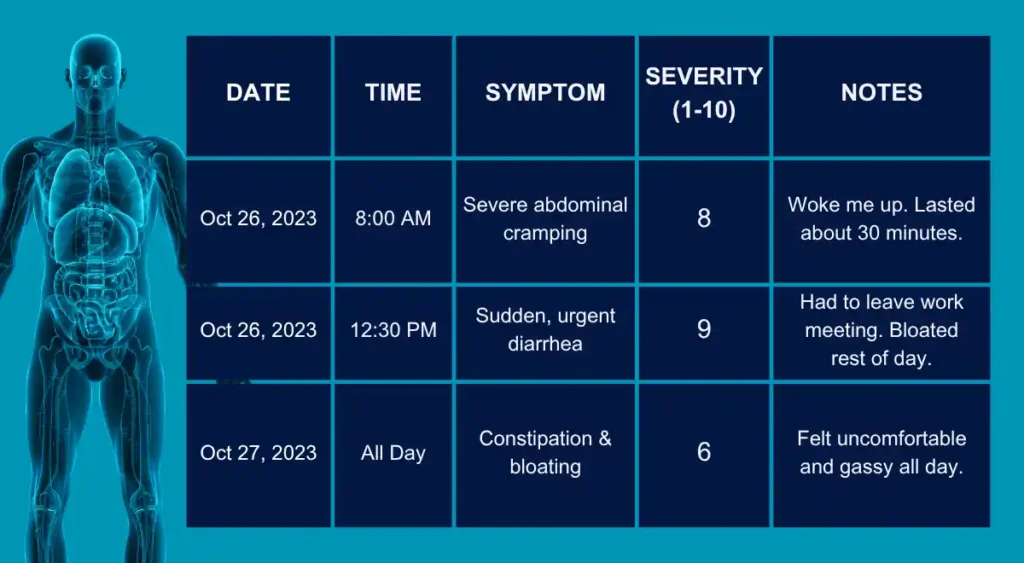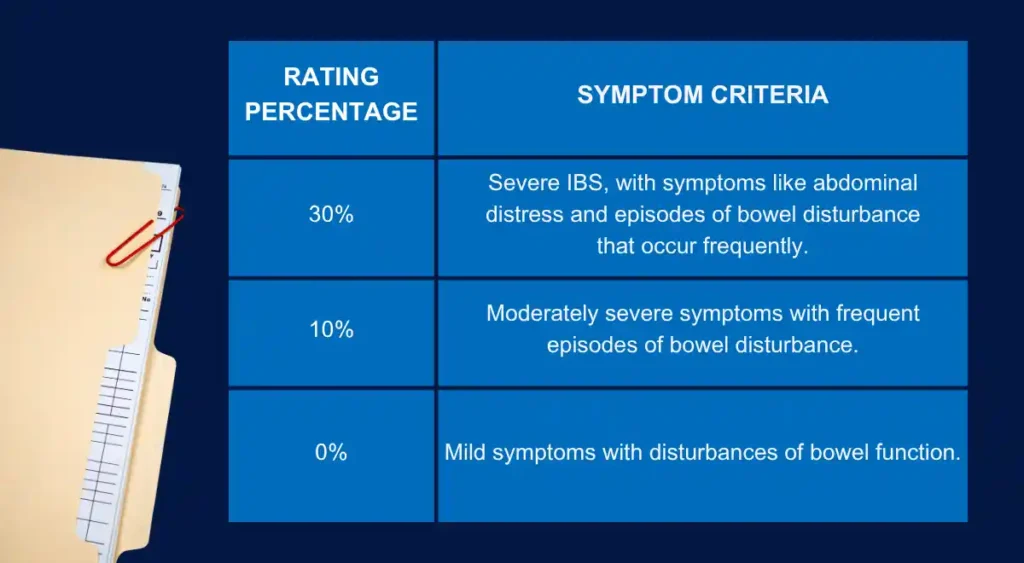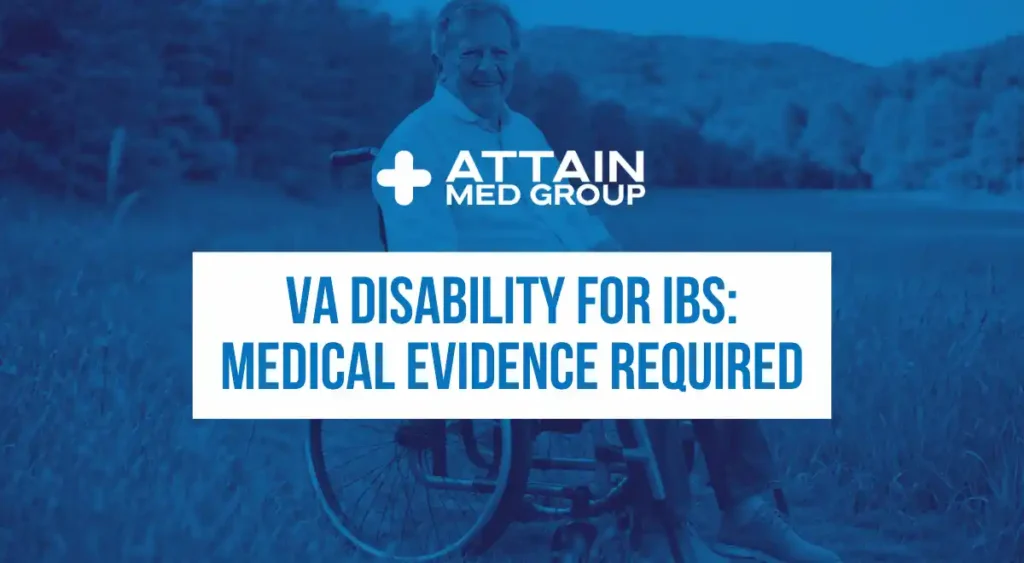Living with Irritable Bowel Syndrome (IBS) is a constant, frustrating battle. One day you feel fine, and the next you’re mapping out every bathroom on your route just to leave the house. You already know how unpredictable and debilitating this chronic condition can be, and it’s even harder when you know your military service played a role.
Are you considering filing an IBS VA claim? Learn how symptom logs, frequency records and clear medical rationale strengthen your case for benefits. Many veterans think a simple diagnosis is enough, but the VA needs a clear picture of how IBS affects your daily life. This is where your detailed records and medical evidence become your most powerful tools.
This guide will walk you through creating the solid evidence you need for your disability claim. Following these steps is your path to getting the disability benefits you rightfully deserve for your service-connected disability.

Understanding IBS and Your Military Service
Irritable bowel syndrome is more than just an occasional upset stomach. The VA recognizes it as a functional gastrointestinal disorder, meaning your gut does not work correctly. This leads to chronic ibs symptoms like cramping, abdominal pain, abdominal bloating, gas, diarrhea, and constipation that impact your daily activities.
For many veterans, these symptoms did not appear out of nowhere. Think back to your time in service; were you exposed to high levels of stress, irregular eating schedules, or questionable food and water sources? These are all known triggers that can lead to long-term gut problems, which may eventually be diagnosed as irritable bowel.
Many Gulf War veterans and post-9/11 veterans develop bowel syndrome years after their service, often unaware of the connection. Recognizing this link is the first step in building a successful VA disability claim. It’s about connecting the dots between your duties and your current health issues.
The Critical Step: Getting Service Connected for IBS
Before the VA will consider a VA rating for irritable bowel syndrome, you must prove your IBS is connected to your military service. This process is called service connection, and there are a few ways to establish it. You have to show the VA that your time in the military is the reason you’re dealing with this condition now.
Securing service connection is the most important hurdle in your VA disability claims process. Without it, your disability claim will be denied, regardless of how severe your ibs symptoms are. This connection is the foundation of your entire case for VA disability benefits.

Direct Service Connection
The most straightforward path to a service-connected disability is showing your IBS began while you were on active duty. This is called direct service connection. Do you remember complaining about stomach issues during your service?
Your Service Treatment Records (STRs) are the best evidence for a direct service connection. Look through your records for any mention of stomach pain, issues with bowel movements, diarrhea, or other digestive problems. Even minor complaints noted by a medic can become key evidence.
If your struggles are not in your records, you still have options. You can use personal statements to explain your experience in your own words. Additionally, buddy statements from people you served with can be very powerful, as they can recall you having these issues while on duty.
Secondary Service Connection
What if your irritable bowel syndrome started after you left the military? You can still achieve service connection if you can prove it was caused or aggravated by another condition for which you already have a VA disability rating. This is known as establishing ibs secondary to another condition.
There’s a strong link between mental health and gut health, for example. Many veterans with service-connected PTSD, anxiety, or depression also develop IBS. The constant stress from these secondary conditions can significantly disrupt your digestive system.
To prove this, you will need a doctor to write a nexus letter explaining the connection. This medical evidence must clearly state how your primary service-connected condition caused or worsened your IBS. The letter provides the clear medical rationale the VA needs to approve these types of disability claims.
The Gulf War Presumptive Connection
For many veterans, this is a significant advantage. If you served in the Southwest Asia theater of operations after August 2, 1990, the VA assumes certain conditions are related to your service. The good news for any Gulf War veteran is that irritable bowel syndrome is on this list of presumptive conditions.
This means you do not have to provide a nexus linking your service to your IBS. You only need to show you served in a qualifying location and have a current diagnosis of irritable bowel syndrome VA disability rated at 10% or more. This presumption makes the va claims process much simpler for eligible veterans from the Gulf War era.

Strengthening Your Claim with Key Evidence
Now, let’s focus on the most important part of your disability claim: your evidence. A diagnosis from your doctor is a great start, but it’s not enough to get the disability rating you deserve. The VA needs to understand the severity and frequency of your symptoms to assign VA disability ratings, and this is where you take control.
Consider yourself the primary source of information for your va claim. Your doctor sees you for brief appointments, but you live with this condition 24/7. Your job is to paint a clear, detailed picture of that daily reality for the VA rater who will decide your case.
The Power of a Detailed Symptom Log
A symptom log is a daily diary of your irritable bowel syndrome. It is a simple but incredibly effective tool for demonstrating the true impact of your condition. Instead of just telling the C&P examiner you have bad days, your log will show them exactly what a bad day looks like with concrete details.
Your log should be as detailed as possible. Be sure to track the date and time of each symptom, what the symptom was, such as cramping, bloating, or urgent diarrhea, and a severity rating from 1 to 10. You should also record details about your stool frequency and any straining and/or urgency associated with stool passage.
Also, add notes about potential triggers. Did you eat something specific, or was it a stressful day at work? This information helps create a pattern that supports your claim and shows how your daily life is affected by this bowel syndrome.

A log like this, kept consistently for at least a few months, is powerful proof. It turns vague statements into concrete evidence that the VA can use to properly assign a VA rate for your condition. This documentation helps show the full extent of your syndrome VA disability.
Frequency Records: Show, Don’t Tell
Telling the VA you have frequent episodes of diarrhea is not as powerful as showing them. This is where frequency records come into play. Your symptom log will naturally create a frequency record over time.
At the end of each week or month, tally up your symptoms to create a summary. For example, “In October, I experienced urgent diarrhea 12 times and had severe abdominal cramping on 18 different days.” This specific data is exactly what the VA needs to understand the chronic nature of your bowel syndrome VA disability.
It helps them match your symptoms to the language in their rating schedule for disability ratings. More importantly, it demonstrates how significantly IBS impacts your ability to live a normal life. This evidence can be the difference between a low rating and the maximum 30% va disability rating for ibs va.
The Nexus Letter: Your Doctor’s Expert Opinion
A nexus letter is a medical opinion from a qualified professional that connects your IBS to your military service. While it may not be needed for a presumptive claim, it can be extremely helpful for direct service connection or secondary service connection claims. This letter acts as the medical bridge between your condition and your service.
A strong nexus letter will state that your doctor has reviewed your medical and service records. The doctor will then give their professional opinion that your IBS is “at least as likely as not” caused by your military service or another service-connected condition. The phrase “at least as likely as not” is specific VA language that indicates a 50% chance or greater, which is the standard of proof required.
The letter should also explain the medical reasoning behind the opinion. For a secondary claim, a doctor might explain how chronic stress from PTSD is known to disrupt gut function, leading to symptoms of IBS. This clear medical rationale provides your claim with the expert backing it needs for approval.
How the VA Assigns a Rating for IBS
The VA rates irritable bowel syndrome under the digestive system rating schedule, Diagnostic Code 7319. The VA disability ratings are based on how severe your symptoms are and how often they occur. This is why your symptom logs and frequency records are so vital to your claim.
Your evidence helps the VA rater place you in the right category. The ratings for IBS are 0%, 10%, or 30%. A 30% rating is the highest schedular va rating for ibs, which is significant and recognizes the serious impact of the condition on a war veteran.
The VA rates irritable bowel syndrome at three levels. A 0% rating is non-compensable but still establishes service connection. A 10% or 30% rating provides a compensable rating and monthly benefits.

As you can see, words like “frequent” and “severe” are key. Your evidence is what gives these words meaning. Without your detailed logs, a VA rater is left to guess at the severity of your condition, which could lead to an inaccurate ibs va rating.
Putting It All Together: A Step-by-Step Guide
You have a good understanding of what you need now. Let’s walk through the actual steps of filing your va claim. Following these steps can help make the process smoother and increase your chances of a successful outcome.
Step 1: Get a Current, Official Diagnosis
You cannot file a claim for a condition you have not been diagnosed with. If you haven’t already, see a doctor about your stomach issues. Get an official diagnosis of Irritable Bowel Syndrome put into your medical records, as this is the non-negotiable first step.
Step 2: Gather All Your Supporting Evidence
This is where all your hard work comes together. Compile all the documents that support your claim. This includes your Service Treatment Records, any private medical records related to your irritable bowel syndrome va, and your new, detailed symptom and frequency logs.
Do not forget lay statements, also known as buddy statements, from family, friends, or fellow service members. These statements can describe how your IBS symptoms have affected your life. If filing IBS secondary to another condition, this is also when you would obtain a strong nexus letter from your doctor.
Step 3: Fill Out and Submit Your Claim
The main form for disability compensation is VA Form 21-526EZ, Application for Disability Compensation and Related Compensation Benefits. The easiest and fastest way to file is online through the VA website. You can upload all your evidence directly with your application.
Step 4: Prepare for Your C&P Exam
After you submit your claim, the VA will likely schedule you for a Compensation and Pension (C&P) exam. This is an appointment with a VA doctor or a VA-contracted doctor. The purpose of this exam is for the doctor to evaluate your condition and give their medical opinion to the VA.
Do not downplay your symptoms at this exam. This is not the time to be tough; be completely honest about how bad your symptoms are on your worst days. Bring a copy of your symptom log with you to the appointment and refer to it when describing your experience with subjective distension or pain.
Explain to the examiner exactly how irritable bowel syndrome VA disability limits your work, your social life, and your overall quality of life. Be prepared to discuss the frequency and severity of all your symptoms. The information you provide will be critical in determining your final ibs va rating.

Conclusion
Filing a VA claim for IBS can feel like a difficult journey, but it is one you can win. You do not have to settle for a low rating or a denial when your life is genuinely impacted by this condition every single day. The difference between a weak claim and a strong one comes down to the quality and detail of your evidence.
It’s not enough to tell the VA you suffer; you have to show them with documentation. Because you are now informed on filing an IBS VA claim? Learn how symptom logs, frequency records and clear medical rationale strengthen your case for benefits. That knowledge gives you the power to build a successful claim for your bowel syndrome va.
By taking the time to document your daily struggles through symptom logs, gathering supportive medical evidence, and clearly explaining the service connection, you give the VA a clear and undeniable reason to approve your claim. This is how you secure the VA disability you have earned.

